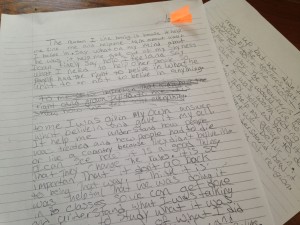
How do you light up a classroom? With Jenna’s* glow … the sparkle in her eyes … as she shares her passionate understanding. Passion is not a word usually associated with my shy, angry Jenna. Being raised by her grandmother, hurt by her mother who sent her father to jail, and compromised by a reading disability, Jenna is often not engaged in the classroom learning. When she is, her comprehension errors tend to overwhelm her.
A few weeks ago, Jenna participated in a culminating activity of the Simulated Congressional Hearing (http://www.civiced.org/wtp-the-program/hearings). She spoke about the First Amendment right to freedom of religion. It is not easy to interpret a Supreme Court case, let alone use portions as an argument for your opinion, and so the SCH is often only offered for the strongest students, perhaps even as an after school club. However, this year the social studies teacher and I (language arts teacher) decided we would make the opportunity available to every student. And with a great deal of creative learning opportunities, we did. Jenna was, this year for the first time as an eighth grader, placed in a co taught class rather than in a self-contained setting. And yet, her small SCH group (which included two others who had been in self-contained until this year) was chosen to present their arguments to the guest “judges” which included the city mayor and visitors from the state who “wanted to see how SCH would work in an all class setting.” When the trio walked out of the room following their presentation, Jenna’s friend Janetta leaned against the wall with tears whispering, “I didn’t know I was that smart.” If that wasn’t convincing enough that our work was well worth it, the growth in Jenna is inspirational —
As Jenna comes excitedly to class, day after day now, I ask her what has changed for her. My student, who writes very little and is afraid to go beyond surface responses, asks for time to write to me about it.
Two pages later my heart is pierced with joy:
“The reason I liked the hearing is because it help(ed) me find me … and help(ed) me talk about what I believe in, say what is on my mind. It help(ed) me get out of my shyness. I can finally say how I feel and say what I need, to help other people…
“To me I was giving my own answer of what I believe in and I gave it my all. It helped me understand how people were treated and how people had to die or live in a country because they didn’t believe in (that religion). I can see how it is a good thing that they changed the rules. It is so important that it (doesn’t) go back to being that way.
“I think it was helpful that we (were) doing it in the classes so we can get done and (I can) understand what I was talking about. I was proud of what I did and how my group did it… and we were proud of ourselves.
“… Me and my friends were crying because we were so shy… we thought that we would mess up but we didn’t.
“We had support by the teachers. That really helped me to do it, the most part. To me the way the teachers pushed us to do our best I would like to say Thank you. It was worth (it) how they told us to edit our work. That helped my group to do our best on what we believe in.
“It helped my group to understand how it was important for us to have freedom of religion.”
The self-confidence Jenna found and the respect she now receives from her peers, has translated into increased engagement in her lessons.
Having a teacher believe in you isn’t always enough. Sometimes, the gift of an opportunity to believe in yourself is the key to unlock the passion that lights up a classroom.
